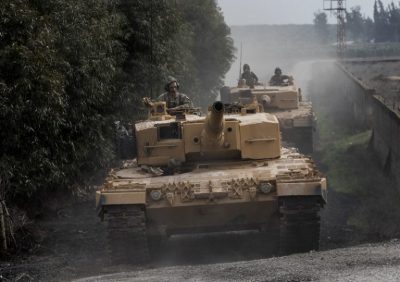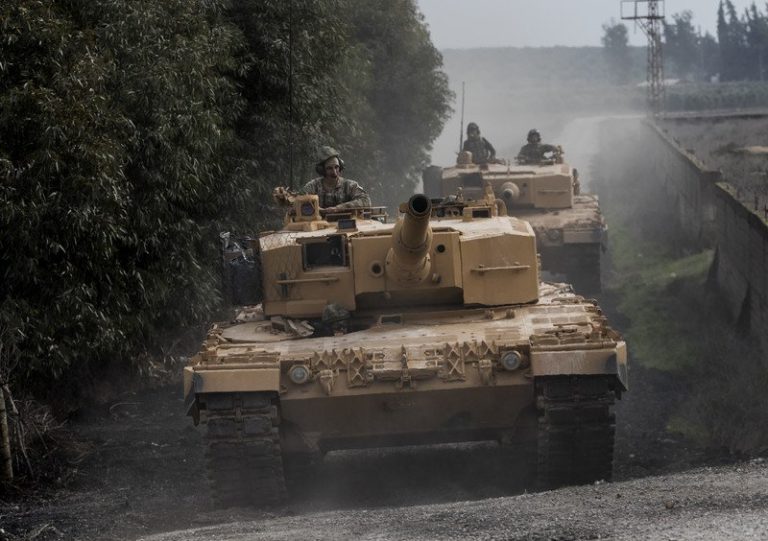Turkey’s Operation Olive Branch against Kurdish YPG/YPJ in Syria’s Afrin

Turkey’s Operation Olive Branch against Kurdish YPG/YPJ forces in Syria’s Afrin entered the third day. According to the Turkish newspaper Haberturk, 6,400 service members of the Turkish Armed Forces (TAF) are involved in the operation. The newspaper added that the following 2 days of the operation, the TAF advanced 7.5km and captured 9 villages.
On January 22, pro-Kurdish sources claimed that YPG members destroyed 2 more Turkish battle tanks in Afrin. However, these reports like the previous “3 destroyed battle tanks” were not confirmed by any photos or videos also. Meanwhile, Turkey-led forces captured the villages of Sheikh Hrouz, Sheikh Bassi, Merso and Haftar from YPG/YPJ forces.
في اليوم الثاني لعملية #غصن_الزيتون.. القوات التركية والجيش السوري الحر يسيطران على مواقع عسكرية خاضعة للوحدات الكردية شمال غرب #عفرين pic.twitter.com/yZwzVSkoae
— قناة الجزيرة (@AJArabic) January 22, 2018
In turn, a representative of the Syrian Kurdistan in Moscow, Rodi Osman, claimed that YPG/YPJ forced the TAF and pro-Turkish armed groups to retreat from all the captured territory.
“Turkish forces and related groups tried to cross over to the territory of the Syrian city of Afrin with the support of the Air Force and missile strikes. However, the Syrian Democratic Forces struck at five positions,” the Russian state-run news agency Sputnik quoted Osman. “Those areas to which they crossed, they left, as the Kurds struck and forced them to retreat.”
Osman added that 10 Turkish soldiers and 20 pro-Turkish militants were killed in the clashes. However, pro-Turkish sources have already released enough photos and videos to confirm that statements that the TAF had achieved no gains in Afrin are baseless.
Pro-Turkish militants are in Sheikh Hrouz:
#الجيش_السوري_الحر يسيطر على تلة الشيخ خورز الاستراتيجية في محيط مدينة #عفرين بريف #حلب الشمالي pic.twitter.com/QTbVVNvYn2
— قناة الجسر الفضائية (@jisrtv) January 22, 2018
The Turkish Prime Ministry’s Office of Public Diplomacy also released an official list of the reasons of the ongoing military operation. The Turkish state-run news agency Anadolu provided a translation of the released note dubbed “What Turkey aims to do with Afrin operation”:
- To ensure the Turkey-supported Free Syrian Army (FSA) takes control of a 10,000-square kilometer area.
- Following on from the Euphrates Shield Operation and the operation in Idlib, to completely prevent the outlawed Kurdistan Workers’ Party (PKK) from reaching the Eastern Mediterranean.
- To eliminate the possibility of losing Turkey’s geographical contact with the Arab world.
- To ensure the security of our borders with Syria.
- To prevent the infiltration of the Syrian Democratic Union Party (PYD) and the PKK into Turkey through the Amanos Mountains.
- To prevent a terrorist organization from opening to the Mediterranean and to the world from here
- To ensure the security and continuation of the Euphrates Shield Operation area.
- To take control of the Tel Rifaat region and ensure the return of civilians to their homelands.
- To counter U.S. support for a terrorist organization.
- The office also added three articles stating “Why Afrin is important to Turkey,” cited as follows:
- Afrin is critical in maintaining the security of Turkey’s border provinces and ensuring the security of the Euphrates Shield Operation area.
- The presence of terrorist organizations in Afrin means that the whole of the southern Turkish province of Kilis and most of the Hatay province are within range of terrorist organizations.
- Turkey sees the merging of the Kobane area with Afrin as the most important pillar of the “Kurdish corridor” project.
Turkish battle tanks involved in the operation:



Pro-Turkish militants involved in the operation:




*
All images in this article are from South Front.


